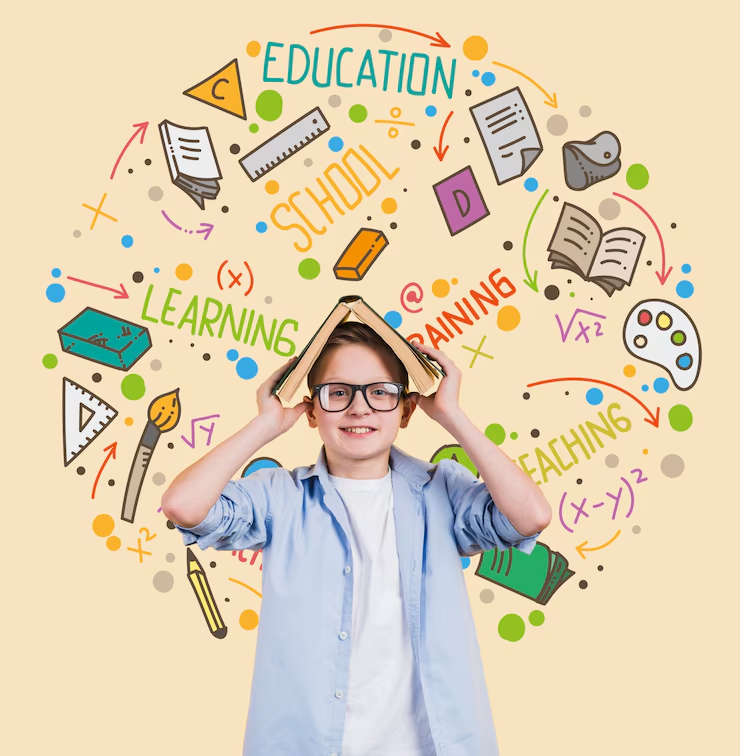Table of Contents
TogglePrimary education is the start of our formal learning. It is really important for setting the stage for our future success. During this time, kids learn the basic skills they need for further education and to find what they love doing. Primary education also plays a big part in shaping who we are. It helps build our personality, values, and habits. These influence how we interact with others and our overall happiness.
Key Takeaways
- Primary education lays the groundwork for lifelong learning and development.
- It helps children build essential cognitive, social, and emotional skills.
- Primary education fosters creativity, curiosity, and a passion for learning.
- It shapes values, ethics, and a sense of social responsibility.
- Primary education is a crucial foundation for future success in various domains.
Importance of Primary Education for Future Success
Primary education is key in growing the skills needed for success later on. This is especially true in today’s changing work world. The abilities learned early have a big impact on how much someone can earn, how productive they are, and their creativity in their job.
Developing Cognitive, Social, and Emotional Skills
It’s in primary education that children first learn to think, solve problems, and make decisions. These are vital for doing well in school and work later on. Kids also pick up how to talk and work with others. This helps them handle the social parts of jobs. Primary schools also help kids learn to control their feelings and bounce back from tough times.
Fostering Creativity, Curiosity, and Passion
During primary school years, children’s creativity and love for learning starts to bloom. Here, they get to try new things and find what they’re good at. Knowing how to be creative and having interests is very important in the business world today. It’s all about new ideas and positive thinking.
Shaping Values, Ethics, and Social Responsibility
Primary education also teaches important values and how to be a good person. This doesn’t just help someone’s happiness. It guides how they lead in business, make choices, and help society. Big companies like IBM and Deloitte look for people with these strong values. They know that what you learn early stays with you and helps make a better world.
Also Read : What Are The Most Popular Fields Of Study In Online Education?
Skills and Values Cultivated in Primary Education

Primary education is where many essential skills and values begin. They help shape the future of everyone and our communities. Here are some important skills and values that students grow in primary education:
Curiosity and Creativity
Primary schools help students become curious and creative. They teach kids to explore their interests and think in new ways. By doing things with their hands, children learn to be more creative, imagine, and solve problems. These skills are highly praised by big companies like IBM, Adobe, and LinkedIn because they mean more innovation and the ability to adjust.
Collaboration and Communication
Working together and talking effectively are big lessons in primary education. Students learn to team up, exchange ideas, and hear out different views. Such skills are key in today’s jobs, where teamwork is crucial. Google and Harvard Business Review say that good communication and working well with others are top skills for getting ahead in your career.
Critical Thinking and Problem-Solving
Learning how to think deeply and solve problems starts in primary school. Kids are taught to think things through, ask why, and use their logic. Companies like Stanford University say these are the skills they really look for. They’re key for handling the many challenges of today.
Resilience and Self-Regulation
Being strong and in control of ourselves is another big lesson in early education. Students find out how to handle tough times and control their feelings. These skills help in life and work. Big names like LinkedIn and Google know how important these are for doing well over time.
Also Read : How Do I Prepare For Interviews For Marketing Jobs?
Challenges and Opportunities in 21st Century Primary Education

In the 21st century, primary education is facing many changes. These challenges and opportunities need new and adaptable solutions to keep education good, up-to-date, and for everyone. The world is changing fast because of globalization and digitalization. This has brought both challenges and new chances for schools.
Impact of Globalization and Digitalization
Because of globalization, schools now deal with many new cultures, languages, and ways of learning. Teachers need to help students learn about others and become good global citizens. Also, the fast arrival of digitalization means students must be good at using technology. They must know how to use it safely and smartly.
Equity and Inclusion
Making primary education fair for all is still a big issue. Many kids face problems like poverty, conflict, discrimination, disability, or living in far-away places. It’s vital to fight these problems by including all kids in the learning process. This makes sure every child can do their best and learn well.
Lifelong Learning Opportunity
Primary schools are where students start to learn skills that will help them throughout their lives. These skills include critical thinking, being creative, working together, and how to communicate well. By teaching these, primary schools get kids ready for future jobs and help them grow as people and as citizens of the world.
Also Read : What Are The Benefits Of Pursuing A Job In Remote Working Careers?
Role of Stakeholders in Supporting Primary Education
Primary education is a key human right and the start of becoming future leaders. The skills, values, and attitudes kids learn at this stage stay with them. It affects their personal development and professional development, and makes them happy. So, support from teachers, parents, and policymakers is vital.
Teachers shape how primary school kids learn. They make learning fun, build a positive environment, and give kids the support they need. Teachers keep learning too, making their teaching better for kids today.
Parents also play a big part in primary education. They help their kids with schoolwork, push them to learn always, and join school events. When parents and teachers work together, they help students feel supported and happy.
Policymakers are important. They make the rules, fund schools, and make sure every child gets a good education. If they focus on primary education, they can improve it for kids, deal with unique problems, and make school better.
By everyone working together, primary education improves. This helps kids be their best, happy selves. Teachers, parents, and policymakers all play a part in this important process.
Developing Lifelong Learning Attitudes in Primary Education

Lifelong learning is key for growth. Primary education is vital for shaping our learning attitudes. Six attitudes, vital for life-long learning, are set early on according to the OECD.
Sense of Belonging to the School Community
Feeling part of a school community sparks a love for learning throughout life. In primary school, a caring, welcoming atmosphere is built. Students feel like they matter and belong.
Relevance of School for Future Careers
When school clearly links today’s lessons to future work and life goals, students get it. They see the worth of learning for their dreams and the ever-changing job world. This insight can lead to a lifelong passion for learning.
Motivation to Master Tasks
Getting students excited about learning leads to lifelong learning. Primary education helps kids love a challenge, keep trying through tough times, and feel proud of what they achieve. This lays a strong foundation for a lifetime of learning and self-growth.
Ambitious Learning Goals
Primary schools that challenge students with achievable goals encourage ambition. They learn to strive for the best. This mindset prepares them for a future where they seek opportunities that both challenge and reward them.
Self-Efficacy
Believing in one’s ability to learn makes a huge difference. When kids believe in themselves, they take charge of their learning and face new challenges without fear. Self-belief is crucial in learning and growing throughout life.
Enjoyment of Reading
Early on, loving to read opens doors to a lifetime of learning from different sources. It boosts school success and reading skills. The joy and habit of reading are core to lifelong learning success.
By focusing on these learning attitudes, primary education helps us excel in a changing world. It ensures we keep growing, improving, and learning throughout our lives.
Also Read : Why Is Science Education Vital For Today’s Students?
Primary Education

Primary education, or elementary education, is the first step in a child’s formal learning journey. It happens between the ages of 6 and 11 or 12. This phase is very important for a child’s growth, helping them set the stage for future success in school and beyond. Kids learn the basic subjects like reading, writing, math, and science at this time.
The main goal of primary education is to give kids a solid start in learning. It paves the way for them to do well in more advanced studies and in life. This early schooling is a key part of how a child learns to think, understand the world, and interact with others.
In primary school, children move up through grades, from kindergarten or first grade up to fifth or sixth. The things they learn build on what they knew the year before. This makes sure they keep getting smarter and more skilled as time goes on.
Primary school is something kids must go to, according to the law. Being forced to go shows how important it is for everyone to get a good start in education. It doesn’t matter how much money your family has or where you come from, everyone should have this chance.
During primary school, children learn a lot about reading, math, and how to think through problems. These basic skills are not only important for school but also for their future jobs and everyday life. What they learn in these early years helps shape who they become as adults.
Preparing Students for the Future of Work and Skills

The work world is changing quickly, and primary education plays a key role in getting students ready. It should teach them how to be innovative, think critically, and learn independently. These are crucial skills for the future.
Developing Innovation Skills
Being able to think creatively is more important than ever in the 21st century workforce. Primary schools should push activities that spark innovation. These include project-based learning, solving problems, and getting to know new tech. Encouraging students to take chances and look beyond traditional ideas helps create future innovators and solvers.
Encouraging Critical Thinking
Thinking critically helps people make smart decisions and handle change well. Primary education can teach this through inquiry-based learning and discussions that challenge students’ thoughts. By working on these skills early, schools give students the tools they need to face the future job market.
Fostering Independent Learning
Being able to learn on your own is key in our fast-changing world. They can do this by providing Experiential learning tailored to each student, projects, and using digital tools. This helps students love learning and be open to new ideas. It sets them up for a life of learning and staying adaptable in their future work.
Also Read : How Can Job Seekers Effectively Customize Their Resumes?
Setting SMART Goals in Primary Education
In primary education, setting clear goals is key to motivate students. The SMART approach – Specific, Measurable, Achievable, Relevant, and Time-bound – is great for this. Teachers and educators use this to make learning engaging for students. It helps them play an active part in their primary education and love learning for life.
Specific goals show students exactly what they need to do. For example, they might need to master a math concept. Measurable goals let students see their progress and feel proud of what they achieve. This encourages them to keep trying and stay positive.
Goals should be relevant to what students care about and their future plans. This makes learning more interesting for them. Time-bound goals, with clear deadlines, offer a sense of urgency. It also prepares students for further studies and their future work life.
Also Read : What Are The Key Benefits of Integrating Education Technology?
FAQs
Q: What is the purpose of primary education?
A: The purpose of primary education is to provide a foundational education in literacy, numeracy, and other essential skills to children during their early years of schooling.
Q: How does primary education influence lifelong learning?
A: Primary education sets the foundation for lifelong learning by equipping students with basic knowledge, skills, and values that are essential for further education and personal development.
Q: What is the role of UNICEF in promoting primary education?
A: UNICEF plays a crucial role in advocating for universal access to quality primary education, ensuring that all children, especially those in disadvantaged communities, have the opportunity to enroll and complete primary school.
Q: Why is it important for primary education to focus on literacy and numeracy skills?
A: Literacy and numeracy skills are fundamental for a child’s overall development and success in later stages of education and life. Primary education lays the groundwork for these essential skills.
Q: What age group does primary education cater to?
A: Primary education typically caters to children between the ages of 6 to 12 years, focusing on the initial years of formal schooling before progressing to secondary education.
Q: Is primary education compulsory?
A: Primary education is often compulsory in many countries, aiming to ensure that all children have access to basic education and acquire essential knowledge and skills during their formative years.
Q: How does primary education help in addressing the goal of universal access to education by 2030?
A: Primary education plays a crucial role in achieving the goal of universal access to education by 2030 by laying the foundation for inclusive and equitable quality education for all, as outlined in the Sustainable Development Goals.
Source Links
- https://fastercapital.com/content/Primary-education-and-lifelong-learning–From-Classroom-to-Boardroom–How-Primary-Education-Shapes-Business-Leaders.html
- https://blog.pearsoninternationalschools.com/how-to-turn-your-students-into-lifelong-learners/
- https://www.oecd-ilibrary.org/sites/3b47638c-en/index.html?itemId=/content/component/3b47638c-en





